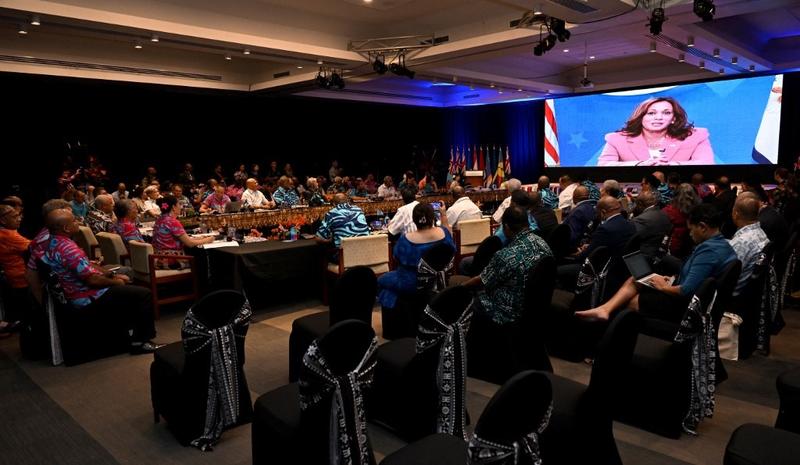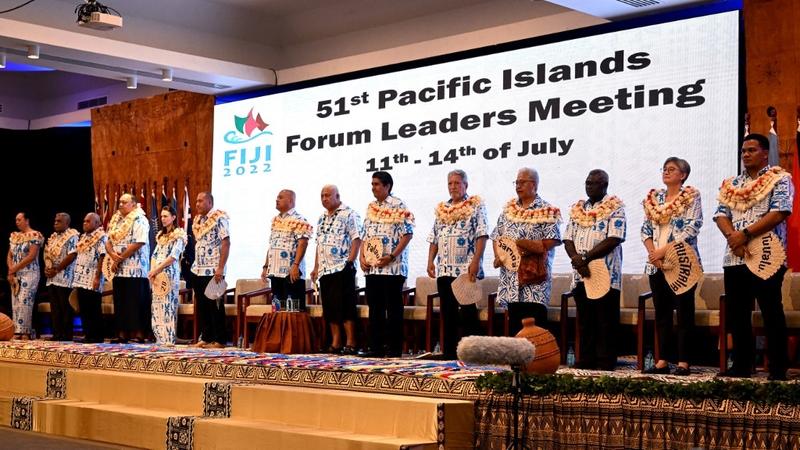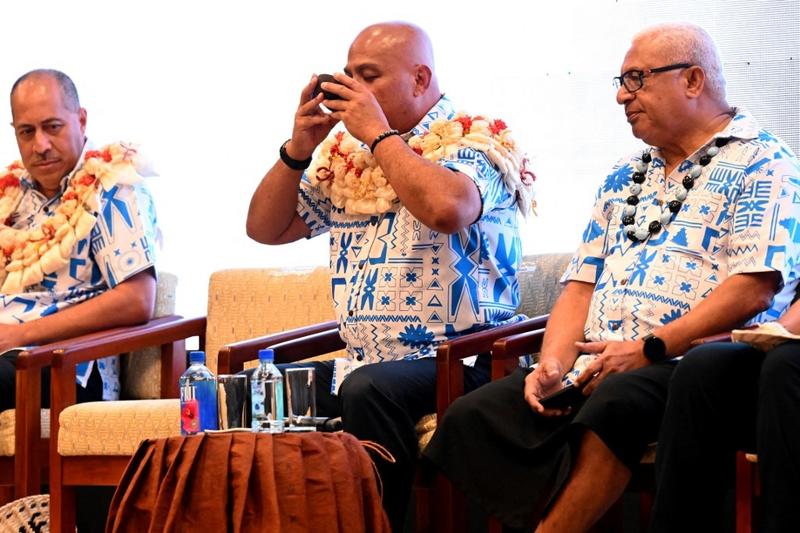 US Vice-President Kamala Harris speaks via video-link to the Pacific Islands Forum in Suva on July 13, 2022.
(WILLIAM WEST / AFP)
US Vice-President Kamala Harris speaks via video-link to the Pacific Islands Forum in Suva on July 13, 2022.
(WILLIAM WEST / AFP)
Until China stepped up cooperation in the Pacific and offered solutions to development and climate issues, the United States had virtually ignored the region for decades.
After China’s State Councilor and Foreign Minister Wang Yi toured the region recently, the US sat up and started to take notice and is sprinkling largesse across the region in the hope of gaining a foothold once again.
After China’s State Councilor and Foreign Minister Wang Yi toured the region recently, the US sat up and started to take notice and is sprinkling largesse across the region in the hope of gaining a foothold once again
US Vice-President Kamala Harris on July 13 used the Pacific Islands Forum to announce that the United States will ramp up its presence in the region.
Appearing virtually in Suva, Fiji, despite other major powers such as China being excluded, Harris announced two new embassies would be established in the region – one in Tonga and another in Kiribati, which over the weekend announced it was pushing ahead with its plan to pull out of the PIF.
ALSO READ: Fijian PM: Pacific region can balance threats with strengths
Harris said the US will appoint a new envoy to the PIF and invest an additional $500 million in funding for the Pacific Islands Forum Fisheries Agency in return for fishing rights – an issue which has been a constant thorn in the side of Pacific nations.
She also announced the US will reestablish a United States Agency for International Development (USAID) regional mission in Fiji and bring Peace Corps volunteers back to the region.
Harris announcement comes as Beijing is engaging the region through aid and development assistance.
In her address, Harris admitted the Pacific has not been receiving the diplomatic attention from the US that it deserved.
 Leaders arrive for traditional welcoming ceremonies at the Pacific Islands Forum in Suva on July 12, 2022. (WILLIAM WEST / AFP)
Leaders arrive for traditional welcoming ceremonies at the Pacific Islands Forum in Suva on July 12, 2022. (WILLIAM WEST / AFP)
Pichamon Yeophantong, senior lecturer in International Relations and Development at the University of New South Wales Canberra, said: “Strategic competition over the Pacific has heightened the anxieties and interests of both the US and Australia in the region.”
She said with the narratives focusing on what is happening in the region, “sometimes it feels like the Pacific islands are being treated like passive bystanders”.
“In reality, however, they are very good in diplomacy, hedging and balancing between regional powers, and we have seen that come through recently.”
“The point is the Pacific has always been there. Their priorities and needs are very clear. Climate change and development, along with security, rank highly in their policy agendas.”
ALSO READ: Wang Yi: China willing to help Pacific island nations to prosper
She said the Pacific island countries know what they want and need. “So, if one of these regional players doesn’t meet their needs, they will go elsewhere.”
Professor David Goodman, director of the China Studies Centre at the University of Sydney, said the US announcement comes as China is expanding its influence in the region through development assistance and aid.
He said there is another aspect to the announcement, and it has nothing to do with China and everything to do with Australia.
“The fact Australia was unaware of China’s talks with the Solomon Islands did not go down too well in the US State Department,” he said.
ALSO READ: Why US is worried about Pacific islands
The US announcement, meanwhile, has overshadowed the split taking place among the 18-nation “Pacific family”, which includes Australia and New Zealand.
The PIF is already showing signs of fragmenting over a long-running dispute on the rotation of secretary-general.
Kiribati’s President Taneti Maamau, in a letter to the forum’s Secretary-General Henry Puna, said he would not be attending the gathering and that his nation would withdraw from the grouping immediately.
His move stems from a long-running disagreement over how the position of secretary-general should be shared between Polynesian, Melanesian and Micronesian candidates.
 President of the Federated States of Micronesia David Panuelo drinks a bowl of kava during traditional welcoming ceremonies at the Pacific Islands Forum in Suva on July 12, 2022. (WILLIAM WEST / AFP)
President of the Federated States of Micronesia David Panuelo drinks a bowl of kava during traditional welcoming ceremonies at the Pacific Islands Forum in Suva on July 12, 2022. (WILLIAM WEST / AFP)
The forum’s five Micronesian members – Marshall Islands, Kiribati, Nauru, Palau and the Federated States of Micronesia – feel they were overlooked when the secretary-general position was given to Puna.
A special committee of the PIF announced last month that a solution had been found and was waiting to be voted on at this week’s meeting
Other no-shows include Nauru, which informed the PIF on July 12 it would not be attending, giving soaring COVID-19 levels in the country as the reason.
Cook Islands Prime Minister Mark Brown also pulled out, and said he wants to focus on elections due in three weeks.
Marshall Islands President David Kabua said he would have attended the summit but was unable, due to pending legislation to terminate the country’s membership in the forum.
ALSO READ: China brings range of benefits to the Pacific
Kiribati’s decision weakens the forum at a critical time, with the region facing intensifying strategic competition and vital issues such as climate change and development.
The new 2050 Strategy for the Pacific, a 30-year plan that will form the basis of Pacific development and engagement, is due to be formally launched at the meeting, on July 14.
Introduced at the Pacific Islands Forum leaders meeting in Samoa in 2018, the strategy has taken six months to finalize.
Pacific Regional Non-Governmental Organisations Alliance leader James Bhagwan said the strategy fostered greater diplomatic power. “It has to work, because we need this as a region,” he said.
READ MORE: China to appoint special envoy for Pacific island nations
He said New Zealand and Australia could learn more from the group and the strategy, in relation to diplomacy involving Pacific nations’ relations with other countries such as China.
Wesley Morgan, senior researcher and climate diplomacy expert with the Climate Council in Australia, said: “In a warming world, climate policy is foreign policy. Under the previous federal government, Australia’s failure to act on climate change undermined our national security – nowhere is that more evident than the Pacific.”


